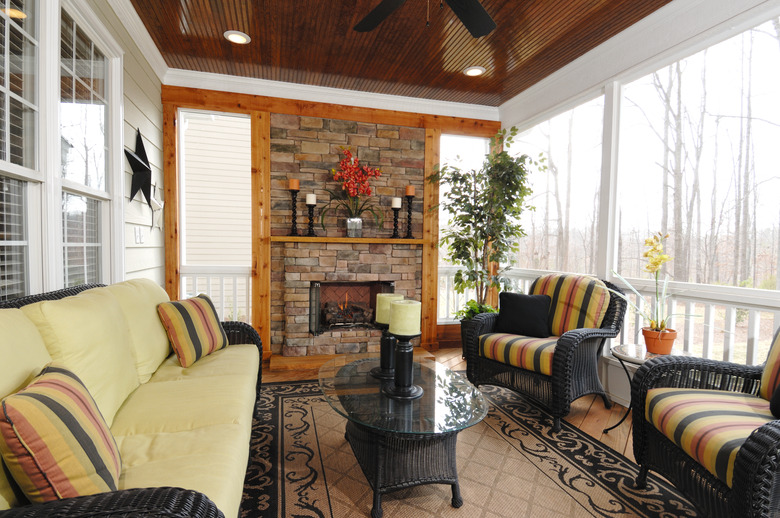Is There A Porch Screen Fabric That Will Repel Water?
We may receive a commission on purchases made from links.
Traditional porch screens are made of wire mesh, allowing airflow while deterring insects. These screens don't repel water, as the open weave that allows air through also allows water through. Some porches are screened in with windows or have protective fabric screen covers for use in inclement weather. The type of screening used on individual porches depends on the local climate and personal taste.
Tip
There is no screen material that is fully water-repellent, but fine mesh can resist moisture, and awnings and blinds made from performance fabric can further protect your porch.
Fine Mesh Screens
Fine Mesh Screens
Mesh screens are graded according to the number of holes per square inch. A mesh screen with a low number has a coarse, open weave. A high number indicates a very fine mesh with small holes. Traditional screens used for insect control are 18 x 14 mesh. A no-see-um screen, meant to keep out tiny insects, is usually a 20 x 20 mesh. While none of the screens repel water, the finer mesh keeps out moisture better than loose mesh does.
Fiberglass and stainless steel are the most common materials used for mesh screens. Other options include aluminum, brass, bronze, and vinyl-coated polyester.
Performance Fabric Awnings and Blinds
Performance Fabric Awnings and Blinds
Performance fabrics for outdoor use are designed to repel water and remain durable under adverse weather conditions. These fabrics feature prominently in outdoor furniture, patio umbrellas, and awnings. An awning extending from the edge of the porch can help protect mesh screens from rain and snow although it doesn't block precipitation completely.
Sometimes screened porches have external performance fabric blinds that roll up and tie out of the way when not in use or that fasten over the screens during inclement weather. Regular heavy-duty outdoor fabric, if treated with waterproofing products, can take the place of performance fabric.
Traditional Glass Windows
Traditional Glass Windows
An enclosed porch offers the protection of traditional windows against the elements. This option is more expensive than mesh screening alone but is practical for climates where high precipitation or cold winter temperatures are common. The windows can remain open during the warm months, creating the atmosphere of a screened porch, but are easily closed when needed.
Window manufacturers offer products that can be custom fit to an existing space to enclose a previously open porch and can often match or complement existing windows in the house. Look for high-quality windows that block ultraviolet rays and insulate the porch to maintain a comfortable temperature and prevent sun damage.
Mesh Screen Maintenance
Mesh Screen Maintenance
Mesh screens can develop holes or tears or can come loose from their frames. To maintain protection from insects and preserve curb appeal, repair or replace screens in a timely manner. A hole smaller than 3 inches in diameter is fairly simple to repair with a self-adhesive repair patch. Use a spline tool, available at most home and garden centers, to force a loose screen back into its frame. Clean porch windows with a commercial glass cleaner or a mix of vinegar and water. Performance fabric is easy to clean with a hose or a wet cloth.
